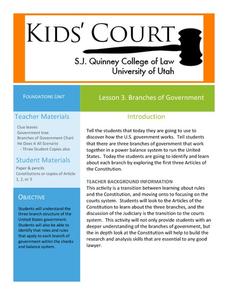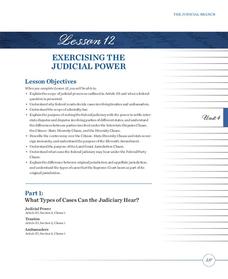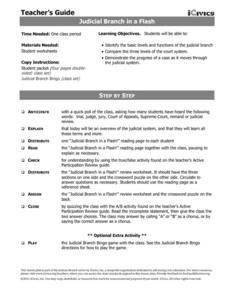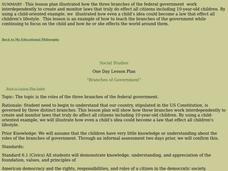Curated OER
Lesson 3: Branches of Government
Young historians climb through the three branches of the US government in the third lesson of this five-part series. While reading the first three Articles of the Constitution in small groups, children write facts on paper leaves that...
Heritage Foundation
Exercising Judicial Power
We should all do more exercising, but should the judicial branch as well? High schoolers develop their understanding of what powers the judicial branch carries because of the US Constitution, as well as where their limits lie in the...
iCivics
Judicial Branch in a Flash
What is the difference between the federal court and state court systems? What about criminal versus civil cases? Check out this resource that will offer your class members a general and effective overview of the judicial branch in the...
iCivics
Mini Lesson: Judicial Activism and Restraint
Scholars analyze the United States judicial branch as it pertains to activism and restraint. They use research to define the roles the courts play while at the same time investigate current events to identify how the media covers those...
Curated OER
Lesson 4: The Judiciary: A Brief Introduction to the Courts System
Focusing on the judicial branch of government, the fourth lesson in this series explores the structure of the US courts system. Beginning with an engaging activity based on the short story The Lady or the Tiger, students go on to examine...
Curated OER
Branches of Government
Students explore the three branches of government. In this government and U.S. history activity, students listen to a story about a boy who attempts to sponsor a bill to ban cartoons. Students interview three teachers who each represent...
Judicial Learning Center
Judicial Independence: What’s Wrong with This Court?
Why is it important for judges to operate independently of politics or other branches of government? Scholars ponder the question as they examine video clips, case studies, excerpts of the US Constitution, and an interactive computer...
Curated OER
New Supreme Court Justice Sworn In
Students react to a series of statements about the Supreme Court, then read a news article about the confirmation of Chief Justice John Roberts. In this current events lesson, the teacher introduces the article with a discussion and...
Curated OER
Egyptian Fairy Tale
Students explore ancient Egyptian culture and government. In this social studies lesson plan, students compare the legal system from ancient Egypt to our current American legal system. Links are included for web searching Egypt and the...
C-SPAN
Judicial Review and Marbury v Madison
The Supreme Court case Marbury v. Madison may not be widely recognized but the landmark case is particularly significant because it established the precedent for judicial review and that the Supreme Court had power as an interpreter of...
Ohio Center For Law-Related Education
Four Activities: Thurgood Marshall and the Nomination and Confirmation of Federal Judges
The process of nominating and confirming federal judges can sound like a lot of bureaucratic hoops, but a resource breaks down the steps of the Supreme Court nominations in a simpler manner. Learners participate in four activities that...
Curated OER
It's Your Right: A Civil Rights Brochure
Learners examine the US Constitution, Bill of Rights, and Supreme Court cases in order to broaden their understanding of the US Judicial System. They research a variety of textual and Internet resources to create a tri-fold brochure,...
iCivics
The Fourth Branch: You!
Take time to remind your young learners of the valuable understanding that each branch of the United States government is really composed of other citizens. The reading material and worksheets of this resource cover the importance of...
Curated OER
The Three Branches of Government
Students write about working in one branch of government. In this branches of government lesson, students read about the three levels of government using various websites and then work in groups to discuss, illustrate and write about...
Curated OER
The Branches of Government
After reviewing and reading about the three branches of US Government, complete this activity with your class. In groups, they will place their "cards" on the board under the correct branch. This lesson is weak and unclear. I'd make a...
iCivics
The “Supreme” in Supreme Court
Does a public school have the right to restrict what t-shirts learners wear? Discover what happened when this question was brought to the Supreme Court, and review other major cases in United States history involving judicial review....
Heritage Foundation
Courts and Judges
If the Supreme Court is so supreme, why do all cases not just start there? High schoolers learn why every case does not start at the Supreme Court as well as the importance of hierarchy in the US judicial system in the 11th installment...
Street Law
The Challenge of Selecting an Ideal Supreme Court Nominee
Nearly every president has had the opportunity to name a nominee to the United States Supreme Court. But what makes someone an ideal candidate to become a Supreme Court justice? High schoolers test their prior knowledge about the Supreme...
American Constitution Society
Constitution in the Classroom: The Right to Vote
The system of checks and balances is integral to the functionality of the United States government. Learn more about the ways the three branches of the government work together—and about the limitations of their power—with an informative...
Curated OER
3 Branches of Government
Fifth graders explain the process of making and passing laws within Congress by simulating this as a class. They review the three branches of government and focus on the legislative branch for the purposes of creating a bill.
Curated OER
Leaders & Leadership: A Political Power Structure from Washington to West KY
Though outdated (the presentation names members of the Bush Administration as current political leaders), these slides could be useful to an industrious teacher who is willing to update the information in the Executive, Judicial, and...
Curated OER
Three Branches of Government
Fourth graders listen to a lecture about the government of Indiana, and the three branches of government. They discuss the reasons for the three branches and read from their text the information on government. Students play a game to...
Curated OER
Separation of Powers Between the Three Branches of
Students investigate the concept of the three branches of government by dividing into three teams. They record the powers of the three branches.
Curated OER
Indiana Courts: How Do They Work?
Students identify the branches of Indiana's judicial system and determine the differences between the different courts and different types of cases. Students create a flow chart showing how a court case works its way through the legal...

























